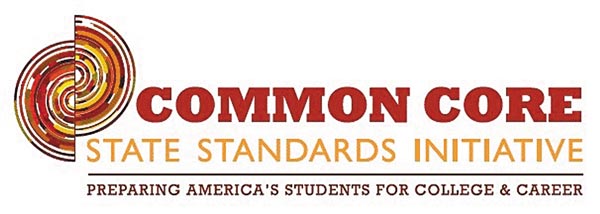No Conclusion To Common Core Confusion
The bluster, blather and pandemonium about Common Core teaching and testing in public schools everywhere but Oklahoma, Texas, Virginia, Alaska, Nebraska and Indiana is very confusing to most parents.
There is no simple “Yes, it’s good” or “No, it’s bad” conclusion.
And it’s not President Obama extending federal reach in the schools. The governors of 48 states developed the standards when President Bush ordered up the No Child Left Behind program in 2001.
Common Core says that students graduating from high school should have taken the critical content courses needed to get into college programs or the workforce.
The main argument seems to be that, if they fail the tests of knowledge, their teachers are dinged as failures and their schools may lose federal money.

Common Core has proponents and opponents as divided as its logo
Teachers and administrators argue that since their schools must accept all comers, they have little control over the learning habits and skills of everyone in the classrooms.
That, to me, is a fair complaint.
The other one is that while Common Core demands reading in classic myths, stories from around the world, America’s founding documents, American literature and Shakespeare, it seems to demand less reading of fiction than many teachers would have on the menu.
In Florida, for example (states can fidget with their Common Core), novels such as To Kill a Mockingbird and The Great Gatsby must give way to nonfiction texts such as The Glass Castle and How to Re-imagine the World, and students are reading only excerpts of The Odyssey rather than the entire book.
The standards require students to apply mathematical ways of thinking to real- world issues — to apply mathematics to situations they may encounter as college students or employees.
Yes, there is a touch of preparing them for the job market, not just college.
But there’s also more focus on depth of knowledge over breadth of it, and I’d call that a plus.
No arguing based only on your personal experiences or opinions.
I’ve tended to argue that we need a common grade-by-grade curriculum, so that a student can move to any state and be right in tune with his or her new school. The facts seem to support that, especially here with our high military-family count.
The testing issue probably will remain opinion-based. I like tests as a measurement of what a student knows, but I am not persuaded that a teacher’s evaluation should rest on the scores.
That promotes teaching to the test.
Also, you can lead a student to mathematics, but you can’t make him a mathematician.
I’ m a prime example of that. I still add 9 and 5 by envisioning 9 and then counting 5 dots in my head! I had D’s in algebra and trigonometry.
Was that my teachers’ fault?
Common Core seems to say it’s as important to think well, whether you end up as a truck driver or an astronomer. I like that.
But that matter of which literature to assign for reading — that seems to need some work.
banyantreehouse@ gmail.com





